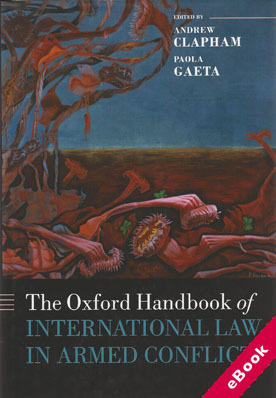
The device(s) you use to access the eBook content must be authorized with an Adobe ID before you download the product otherwise it will fail to register correctly.
For further information see https://www.wildy.com/ebook-formats
Once the order is confirmed an automated e-mail will be sent to you to allow you to download the eBook.
All eBooks are supplied firm sale and cannot be returned. If you believe there is a fault with your eBook then contact us on ebooks@wildy.com and we will help in resolving the issue. This does not affect your statutory rights.
Which human rights violations or war crimes allegations result in exclusion from the refugee regime? What human rights protections apply to someone declared an unlawful combatant? Which human rights obligations apply to the actions of armed forces acting abroad?
Over the past ten years the content and application of international law in armed conflict has changed dramatically. An authoritiative and comprehensive study of the role of international law in armed conflicts, this Oxford Handbook engages in a broad analysis of international humanitarian law, human rights law, refugee law, international criminal law, environmental law, and the law on the use of force. With an international group of expert contributors, this book has a global, multi-disciplinary perspective on the place of law in war.
The Handbook consists of 35 Chapters in seven parts. Part A provides the historical background and sets out some of the contemporary challenges. Part B considers the relevant sources of international law. Part C describes the different legal regimes: land warfare, air war fare, maritime warfare, the law of occupation, the law applicable to peace operations, and the law of neutrality.
Part D introduces crucial concepts in international humanitarian law: weapons and the concepts of superfluous injury and unnecessary suffering, the principle of distinction, proportionality, genocide and crimes against humanity, grave breaches and war crimes, and internal armed conflict. Part E looks at fundamental rights: the right to life, the prohibition on torture, the right to fair trial, economic, social and cultural rights, the protection of the environment, the protection of cultural property, the human rights of the members of the armed forces, and the protection of children.
Part F covers important issues such as: the use of force, terrorism, unlawful combatants, the application of human rights in times of armed conflict, refugee law, and the issues of gender in times of armed conflict. Part G deals with accountability issues including those related to private security companies and armed groups, as well as questions of state responsibility brought before national courts and issues related to transitional justice.